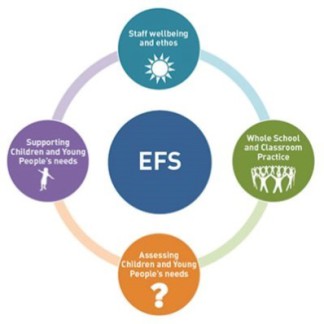Mental Health
At LKPS we believe in promoting positive mental health and emotional wellbeing. This page will be used to supply information and links to support.
LKPS Mental Health Team
|
Mr D Rutter |
Senior Mental Health Lead Lead Mental Health First Aider
|
|
Mrs M Rogers |
Safeguarding Lead Mental Health First Aider
|
| Mrs M Cheetham |
Teaching Assistant Mental Health First Aider |
Mental Health & Emotional Wellbeing
At LKPS, we believe in promoting positive mental health and emotional wellbeing to ensure that the school is a community where everyone feels able to thrive. Our school ethos and values underpin everything that we do to ensure our school is ‘a school where everyone matters’.
Who has mental health?
We all have mental health – some people call this emotional health or wellbeing.
What is mental health?
The World Health Organisation defines mental health as a state of wellbeing in which every individual achieves their potential, copes with the normal stresses of life, works productively and fruitfully, and can contribute to their community. Mental health includes our emotional, psychological, and social wellbeing. It affects how we think, feel and act.
Good mental health and wellbeing is just as important as good physical health. Like physical health, mental health can range across a spectrum from healthy to unwell; it can fluctuate daily and change over time.
Most children grow up mentally healthy, but surveys suggest that more children and young people have problems with their mental health today than 30 years ago. It is thought that this is probably because of changes in the way that we live now and how that affects the experience of growing up.
What helps?
Things that can help keep children and young people mentally well include:
- being in good physical health, eating a balanced diet and getting regular exercise
- having time and the freedom to play, indoors and outdoors
- being part of a family that gets along well most of the time
- going to a school that looks after the wellbeing of all its pupils
- taking part in local activities for young people.
Other factors are also important, including:
- feeling loved, trusted, understood, valued and safe
- being interested in life and having opportunities to enjoy themselves
- being hopeful and optimistic
- being able to learn and having opportunities to succeed
- accepting who they are and recognising what they are good at
- having a sense of belonging in their family, school and community
- feeling they have some control over their own life
- having the strength to cope when something is wrong (resilience) and the ability to solve problems.
What happens in school?
In school, we teach children about what it means to have good mental health and wellbeing throughout our curriculum and daily practice.
Our PSHE curriculum focuses specifically on developing children’s social and emotional skills which can prevent poor mental health from developing and help all children cope effectively with setbacks and remain healthy. It is about helping children to understand and manage their thoughts, feelings and behaviour and build skills that help them to thrive, such as working in a team, persistence, and self-awareness.
What if my child is experiencing difficulties with their mental health and wellbeing?
Mental health doesn’t mean being happy all the time and neither does it mean avoiding stresses altogether. One of the most important ways to help your child is to listen to them and take their feelings seriously.
In many instances, children and young people’s negative feelings and worries usually pass with the support of their parents and families. It is helpful for the school to know what they are going through at these times, so that staff can be aware of the need and support this.
Coping and adjusting to setbacks are critical life skills for children, just as they are for adults, but it is important that they develop positive, rather than negative, coping skills.
If you are ever worried about your child’s mental health and wellbeing then, just as you would about any concerns that you have about their learning, come and talk to us. Sometimes children will need additional support for a short period – this may be in the form of a daily check-in with a trusted adult, time to talk through what they are feeling and support in developing ways of moving forwards with this.
If your child is distressed for a long time, if their negative feelings are stopping them from getting on with their lives, if their distress is disrupting family life or if they are repeatedly behaving in ways you would not expect at their age, then please contact school and arrange a meeting to discuss this with a member of our Mental Health Team.
Looking after yourself
If things are getting you down, it’s important to recognise this. Talk to someone you trust and see what they think. It is easy to go on struggling with very difficult situations because you feel that you should be able to cope and don’t deserve any help.
Come and talk to us, in confidence and let us know when things are tough. As much as you try to hide how you are feeling from your child, they will notice even the smallest changes.
Go to your GP if things are really getting on top of you. Asking for some support from your doctor or a referral to a counselling service is a sign of strength. You can’t help your child if you are not being supported yourself.
Need help?
Getting mental health advice - https://www.salfordccg.nhs.uk/live-well/mental-health/getting-advice
Getting mental health help - https://www.salfordccg.nhs.uk/live-well/mental-health/getting-help
Worried about someone’s mental health - https://www.salfordccg.nhs.uk/live-well/mental-health/worried-about-someone
Urgent help - https://www.salfordccg.nhs.uk/live-well/mental-health/i-need-urgent-help
Having suicidal thoughts - https://www.salfordccg.nhs.uk/live-well/mental-health/preventsuicide
Worried about your child’s mental health – arrange a meeting with a member of the LKPS Mental Health Team
We are an Emotionally Friendly School (EFS) Award
The Emotionally Friendly Schools (EFS) programme is a flexible, whole-school approach to improving children's mental health and well-being.
The accreditation focuses on four key areas:
- Staff Wellbeing and School Ethos
- Classroom Practice
- Assessing Children's Needs
- Supporting Individual Children
One of our key principles, here at Lower Kersal Primary school, is to support the wellbeing of both staff and pupils. We aim to ensure that all children are happy, healthy and able to cope with everything that life may throw at them. We promote and teach all pupils to be resilient, confident, have positive self-perceptions and appropriate coping mechanisms in a seamless and continuous method of delivery. By adopting a whole school approach, we can ensure that wellbeing is central to everything that we do.
As adults, we ensure that we develop our understanding of emotions, self-control, positive relationships and keeping our mind and body healthy, in order to support our wellbeing and therefore we can have the best impact upon the pupils we support. We recognise, however, that the mental wellbeing of both staff and pupils can change from day to day and that there are times in everybody's life when a little extra help or support may be needed. Therefore, we have invested heavily in a supportive and nurturing system, the aim of which is to enable all individuals to flourish whilst in attendance at Lower Kersal.
To support both staff and pupils emotional well-being we have implemented successful intervention initiatives such as: Friendship Formula and Lego Therapy, a full time Pupil and Family Officer who not only works with the children but also parents. We use assessment tools such as Boxall Profiles and Strength and Difficulties Questionnaires. As a school we also seek advice and support from CAMHS (Child and Adolescent Mental Health Service), School Nurse, Speech and Language Therapists, Paediatricians, the Primary Inclusion Team, the Educational Psychology Service and also Salford’s Learning Support Service. This helps to ensure that each individual received the most rounded care possible.
Our EFS Champions are
Mr Rutter, Mrs Rogers and Mrs Cheetham.




